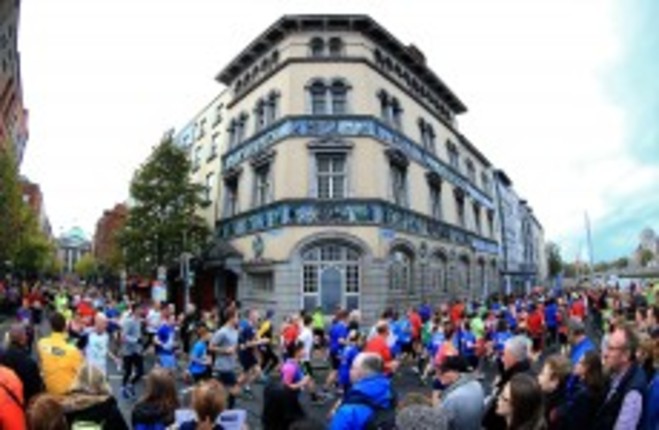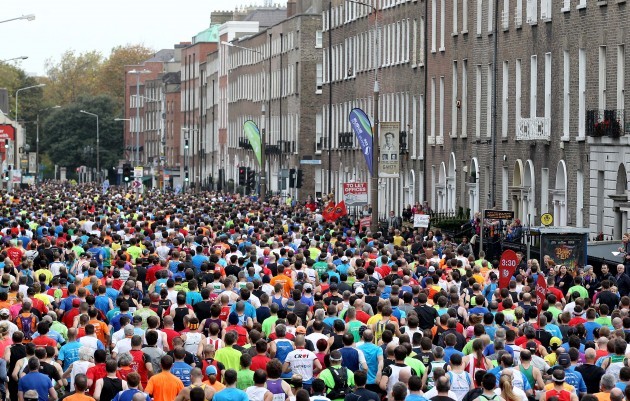THIS SUNDAY’S LONDON Marathon will see hundreds of brave, sweaty and optimistic amateur runners — and a smaller number of hyper-fit professionals — head for the city streets in the hopes of marking their own small piece of personal history.
Some will make things look incredibly easy, screeching home after a touch over two hours before slurping on an energy drink, chatting to a reporter and going on their merry way. Others will be stumbling home to the mall – in some cases clad as rhinos, or carrying a cardboard double-decker bus – six or more hours after setting out.
While most of us can’t even hope to compete with the high-altitude training, full-time agendas and extensive teams of today’s professionals, a secret many marathon runners rarely voice is that getting round the course is eminently doable.
Now let’s be clear, we’re not belittling anyone’s achievements. 26 miles is a long way on foot by any standard, and getting in the kind of shape to finish a marathon course is a rightly enviable accomplishment. But for the modestly young, modestly fit and largely healthy, getting to the finish line is not beyond the realms of possibility.
Delve into typical runners’ world of PBs and Sunday long runs and you’ll soon learn that once the fear dissipates, its more about how long it takes. The second time, most people expect to finish.
The key lies both in effort, and in knowledge.
It’s important to say up front that running a marathon requires a huge time commitment. You’ll either be shoving some things aside for a few months – and making still more room for the key last few weeks – or getting up very early. There are sacrifices, too. You probably won’t want to go out drinking, ever, because of how much it’ll hurt the next day’s exercise. Sometimes you won’t even want to socialize.
At first, the training won’t be so bad. You’ll force yourself out of the door, run round in a few large loops and stumble back in with a slightly sweaty brow. You won’t need to worry about pasta, blisters, or hydration.
The challenges come later.
The long, slow run is key. It’s usually a weekly undertaking, and it has to be slow, because ultimately you’re training your body to keep going. You’re going to suffer, especially when you push from single digit miles to double digit. You’ll suffer again if you indulge in that criminally painful and embarrassing looking stop-start pastime, fartlek.
You need to build distance at a snail’s pace. If only for confidence, incremental increases of no more than a kilometre moderate that sense of the unknown. They also help your body adjust. Variety helps, too: knowing exactly how far you are from home can make things worse, and new scenery distracts when distances are starting to test your limits.
Then there’s routine. Miss a Monday evening jog and – if you’re like me – you’ll soon be missing another. In many ways, it’s discipline that’s being tested, as once you start missing a run or more a week, you’re really not going to achieve what you’re hoping for. None of this stuff is easy, as any of the ample training programs out there will quickly show you. But hey, it’s not supposed to be.
Eventually, you’ll learn to listen to your body. Which part of your foot feels like you shoved it in an electric pencil sharpener? That might be an injury, but more likely it’s your shoes (get them fitted at a specialist running shop, not by your local catch-all sports retailer). Is your energy sapped before you start? You might need a quieter week, but equally you might not have upped your calorie count enough. Or drunk all that extra water you need.
There’s a real sense of change – of almost primal connection and of general well-being – that comes with getting to know your own body well enough to work these things out. It can feel like you’re treading on the toes of human’s adaptive evolutionary purpose; somehow doing what you were built to do. It’s now commonly theorised we’re made simply to chase down prey over exhaustively longer distances, so that makes a strange kind of sense (Christopher McDougall’s ‘Born To Run’ has some fantastic insights, and also answers the eternal amateur athlete’s question ‘why does my foot hurt’).
For me, the whole thing becomes real when you step on to the start line at your first warm up race (and you’ll want to do at least a couple). You might be wearing a football shirt (don’t, they rub you up all the wrong ways!), while the whippet thin club athletes bounce pass you and warm up by doing – of all things – more running. You feel naive, but you get used to it.
Then there’s the marathon expo, where you collect your number, and wonder round stalls dedicated to what greasy liquid to rub on your chaffing nipples, specialist foot support and an incredible number of other exhausting looking events. You’ll collect flyers, or shun them with a ‘never again’ smile. You’ll feel nervous, but perhaps – just perhaps – slightly more like you actually belong.
Because eventually, belong you will. If you think you can’t run a marathon, and your reasons aren’t medical, well that’s probably not entirely true.
When I’m not running marathons – and it’s been several years now – I’m an averagely fit man, but I’ve dragged myself around these distended city running tracks to finish four full-length events so far. They all took over those periods of my life, and gave me confidence, improved my health and an enormous sense of achievement.
None of them, for the record, were particularly fast. There is pain. A lot of pain, at times. But it subsides, and the life lessons don’t.
For most people, the real question is not “can I get around 26.2 miles”, it’s “do I want to finish a marathon enough to put in the work”. Of course, for many people – understandably – there’s a very simple, two letter answers to that question. And that’s just fine; this isn’t for you. This is for the people who have always wondered. You CAN do it.
There’s Limerick next week, Cork in June and the big race in Dublin is on 26 October this year, and entries are open. That’s more than enough time to get training for that one…

